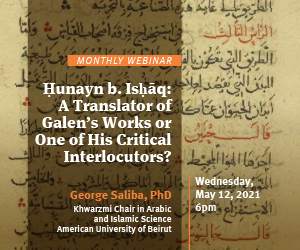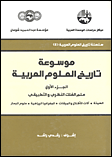Home > Association A. |
|
الجمعية اللبنانية لتاريخ العلوم العربيّة |
باختصار، تتألّف الجمعية اللبنانية لتاريخ العلوم العربيّة من أشخاص يرغبون في دعم البحث في تاريخ العلوم وتشجيعه؛ للجمعيّة شروط انتساب يحدّدها قانونها الأساسي ونظامها الداخلي.
أمّا فريق الدراسة والبحث في التراث العلمي العربي فيتألّف فقط من الباحثين الفعليين أي الذين يتولّون مشاريع بحث في فترة محدّدة، وتنتهي عضويّتهم بانتهاء بحثهم. فالفريق هو إطار لتعاون أعضائه بهدف الدراسة والبحث. وهو لا يتعاطى بالأمور الماليّة والقانوتيّة والإداريّة، وهي أمور يوكل العمل فيها إلى الجمعيّة.
تستقبل الجمعيّة سنويّاً عدداً لا بأس به من الباحثين الأجانب (بشكل خاص، أوروبا) والعرب (بشكل خاص، سوريا والأردن) وذلك في إطار الحلقات الدراسيّة التي تقيمها (مثلا: الندوة العلميّة العربية-الأوروبية).
– من أهمّ إنجازات الجمعية:
افتتاح مكتبة البحث في تاريخ العلوم (مكتبة عادل أنبوبا) في الجامعة اللبنانيّة، بحضور وزير التربية والتعليم العالي ووزير الثقافة، ومسؤولي الجامعة اللبنانيّة والمجلس الوطني للبحوث العلميّة، والمركز التربوي للبحوث والإنماء والمدير الإقليمي للفرانكوفونيّة ومسؤولي العلاقات الثقافيّة في السفارة الفرنسيّة وعدد من أبرز الوجوه الثقافيّة والصحفيّة.
تنظيم ندوة علمية عربية–أوروبية في تاريخ العلوم، حاضر فيها كبار الاختصاصيين العالميين في تاريخ العلوم: د. رشدي راشد، د. كريستيان هوزيل، د. ريجيس مورلون، إلى جانب عدد من الاختصاصيين من أوروبا والبلدان العربيّة.
- المجلّة الإلكترونيّة: دراسات في التراث العلميّ العربي (وجذوره وامتداداته)
Histosc.com
...
إشادات رسمية بمنجزات الفريق
- 2006 - معالي وزير الثقافة د. طارق متري:
ليس غريباً أن تكون "الجمعية اللبنانية لتاريخ العلوم العربية" بادرت إلى هذه الخطوة التي تهدف إلى جمع التراث العلمي العربي وحفظه، فالجمعية سبق لها أن عقدت الندوات والمؤتمرات التي جمعت باحثين مرموقين من الأقطار العربية والأوروبية، في سبيل إحياء هذا التراث الذي ما زال متفرقاً في المكتبات المنتشرة في آسيا وأوروبا من طشقند وطهران إلى دمشق وحلب والقاهرة وفاس. ومن روما إلى باريس ومدريد. وأغلب هذا التراث ما زال مخطوطاً يحتاج إلى التحقيق والتوثيق والتصنيف والحفظ والنشر من أجل أن يوضع أمام الباحثين وطلاب العلم.
- 1998 - معالي وزير الثقافة ميشال إدّة:
بتاريخ 13/11/1998 تمّ في قصر الأونيسكو افتتاح "مؤتمر البحث العلمي والتنمية الصناعية" الذي نظّمه ال .C.N.R.S اللبناني مع جمعية الصناعيين اللبنانيين. كان خطاب الافتتاح من قِبل معالي الوزير ميشال إدّة، ممثلاً رئيس الحكومة، ملفتاً للنظر في حديثه عن الفريق (فريق الدراسة والبحث في التراث العلمي العربي) وإبرازه إنجازاته العلمية، حيث للمرة الأولى ينوّه مسؤول علناً بنشاطات الفريق.
طرابلس لبنان 2/6/2023
ستقام ندوة تكريمية للراحل الدكتور نقولا فارس في بيت الفن الميناء يوم الجمعة الواقع فيه 2/6/2023 الساعة الخامسة.
سيقوم الأستاذ علي عيسى مشكوراً بتمثيل الجمعية وإلقاء كلمة بهذه المناسبة. ويمكن طبعاً لمن يستطيع ويرغب المشاركة بهذه المناسبة.
مؤلّفات ومنشورات نقولا فارس
كان نقولا فارس متخصِّصاً في الجبر وقد حصل على درجة الدكتوراه للحلقة الثالثة من جامعة باريس في أواخر الستّينات. ثمَّ بدأ بحوثه في تاريخ العلوم العربية وفي الترجمة.
مؤلَّفاته :
1- "الجبر ولادته وتطوّره في التقليد الرياضي العربي".
والقسم الفرنسي منه بعنوان :
Naissance et développement de l’algèbre dans la tradition mathématique arabe
منشورات دار الفارالبي، بيروت لبنان 2017.
2- " فصل من دراسة القطوع المخروطيّة وتطبيقاتها في التقليد الرياضي العربي، رسالة أبي جعفر الخازن حول القطوع المخروطيّة"
والقسم الفرنسي منه بعنوان :
Un chapitre sur Les coniques Dans la Tradition mathématique arabe, Traité d’Abû Ja‘far al-Khâzin sur les Coniques.
منشورات مؤسّسة شاعر الفيحاء سابا زريق الثقافيّة، طرابلس، 2023.
3 - "رسالة أبي جعفر الخازن في تفسير الكتاب العاشر من أصول إقليدس" تحقيق وترجمة نقولا فارس منشوؤات الجامعة اللبنانية بيروت 2016.
والقسم الفرنسي منه بعنوان :
Commentaire du livre X des Eléments d’Euclide par Abū Ja‘far al-Khzin.
4- شارك نقولا فارس في ترجمة l’Encyclopédie de l’Histoire des Sciences Arabes : التي قام بها في أوائل التسعينات من القرن الماضي عدد من أعضاء فريق الدراسة والبحث في التراث العلمي العربي. وكان نقولا فارس المنسِّق العامّ لهذه الترجمة التي نّشرت تحت عنوان : موسوعة تاريخ العلوم العربية ، إشراف رشدي راشد بمعاونة ريجيس مورلون. ولقد تضمَّنت ثلاثة أجزاء :
الجزء الأوَّل : علم الفلك النظري والتطبيقي؛ الجزء الثاني : الريّاضيّات والعلوم الفيزيائيّة؛ الجزء الثالث : التقانة الكيمياء علوم الحياة.
تمَّ نشر هذه الموسوعة في مركز دراسات الوحدة العربية، بيروت 1997.
5- "الجبر والهندسة في القرن الثاني عشر مؤلفات شرف الدين الطوسي"، تأليف رشدي راشد، ترجمة نقولافارس منشورات مركز دراسة الوحدة العربية، بيروت 1997.
6- "علم المناظر وعلم انكسار الضوء تأليف رشدي راشد، ترجمة نزيه المرعبي وبدوي المبسوط ونقولا فارس، منشورات مركز دراسة الوحدة العربية، بيروت 2003.
7- "ريّاضيّات عمر الخيّام"، تأليف رشدي راشد وَوهاب زاده، ترجمة نقولا فارس، منشورات مركز دراسة الوحدة العربية، بيروت 2005.
8- "تاريخ العلوم العربيّة التفاعل العلمي بين الثقافات، إعداد وترجمة فريق الدراسة والبحث في التراث العلمي العربي"، بيروت 2007.
9- " رياضيّات الخوارزمي تأسيس علم الجبر"، تأليف رشدي راشد، ترجمة نقولا فارس، منشورات مركز دراسة الوحدة العربية، بيروت 2010.
10- "الهندسة" تأليف رينيه ديكارت، ترجمة نقولا فارس وبدوي المبسوط 2022، الرابطالذي يُمكّن من الاطلاع على الكتاب وتحميله مجانا:
www.histosc.com
11- "إمبراطوريّة الأعداد" دونيس غيدج، ترجمة نقولا فارس ، منشورات دار المجاني بيروت 2011
المقالات العلميّة :
Farès, N. 1995 (1). "Le calcul du maximum et la "dérivée" selon Sharaf al-Dīn al-Tūsī". Arabic Sciences and philosophy. Cambridge University Press. Vol. 5. 2, pp. 219-238.
Farès, N. 1995 (2). “Aspects analytiques dans la mathématique de Sharaf al-Dīn al-Tūsī”. Historia Scientorium, The History of Science Society of Japan, Vol. 5. 1, Tokyo, pp. 39-55.
Farès, N. 2005. “Note sur le choix des courbes fait par al-Khayyâm dans sa résolution des équations cubiques et comparaison avec la méthode de Descartes”. Lebanese Science Journal, Vol. 6-1, CNRS-Liban, Beyrouth, pp. 95-117.
Farès, N. 2007. "Lecture dans certaines œuvres de R. Rashed sur la dimension internationale de la science arabe": paru dans L'histoire des sciences arabes–Interaction scientifique des cultures. Commission Nationale de l'Unesco, la Société Libanaise d'Histoire des Sciences Arabes, et l’ALESCO, Beyrouth.
فارس، ن. 2007. "قراءة في عدد من أعمال رشدي راشد حول بعض مظاهر عالميّة العلم العربي: العلم العربي كمكوِّن أساسي من مكوّنات العلم العالمي" مقال ضمن كتاب "تاريخ العلوم العربيّة-التفاعل العلمي بين الثقافات"؛ اللجنة الوطنيّة اللبنانيّة للتربية والعلم والثقافة (اليونيسكو)، المنظّمة العربيّة للتربية والثقافة والعلوم (الألكسو)، الجمعيّة اللبنانيّة لتاريخ العلوم العربيّة. إعداد وترجمة فريق الدراسة والبحث في التراث العلمي العربي. بيروت، ص. 151-172.
Farès, N. 2009. La notion d'irrationalité selon un mathématicien du Xe siècle: Abū Ja‘far al-Khāzin. Lebanese Science Journal, 10 (2) ; pp. 113-123.
Farès, N. 2015. Al-Khwārizmī et le fondement analytique de l'algèbre. Lebanese Science Journal, Vol. 16, No. 1.
هذه هي محاولة أولى لفهرسة أعمال نقولا فارس. وأشكر مسبّقاً كلّ من يجد ما يجب إضافته.
بدوي المبسوط
( bae43@free.fr ) في 17 أيّار 2023


